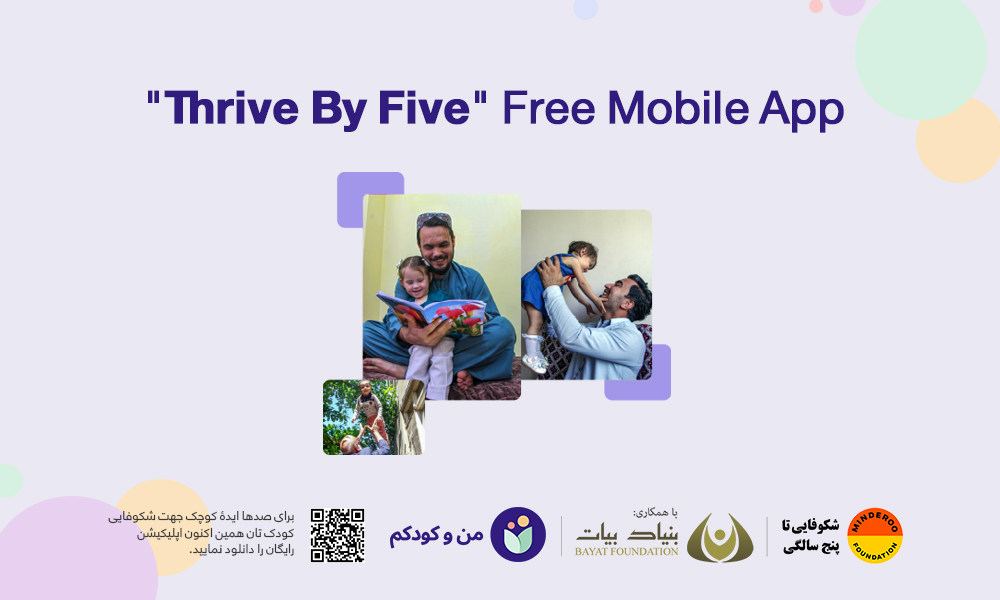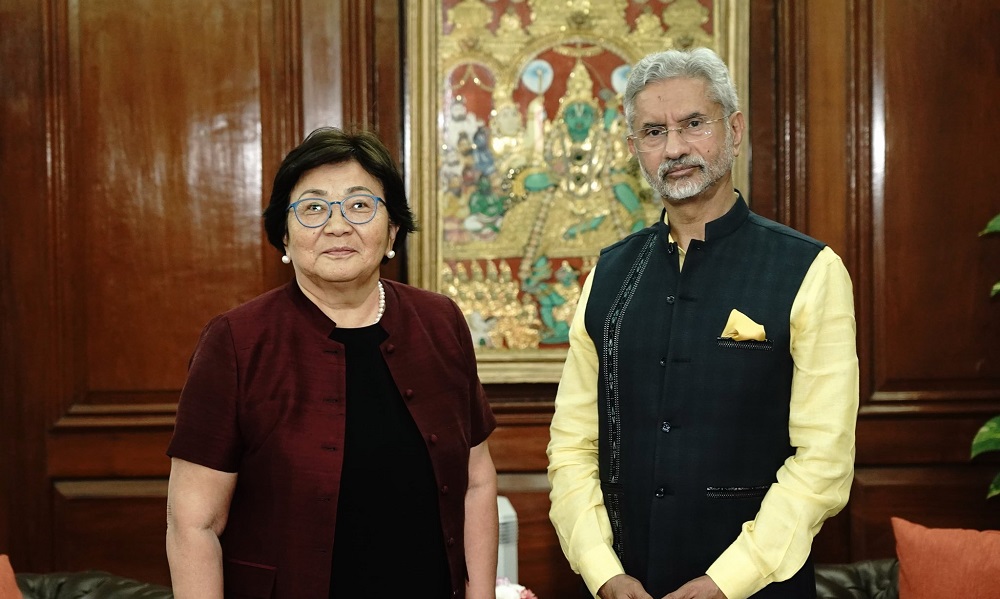Latest News
Bayat Foundation launches early childhood development app for Afghan children

Continuing its founding mission of nourishing the lives of Afghans, The Bayat Foundation (www.bayatfoundation.org), Afghanistan’s largest private philanthropic organization and member of The Bayat Group (www.bayat-group.com) launched a new early childhood development (ECD) initiative aimed at increasing awareness around the importance of a child’s early years, and empowering Afghan parents and caregivers to give their children the best start in life.
Named ‘Mano Kodakam’, this innovative application will inspire parents and caregivers to have more frequent, quality interactions with children and improve their behavior by highlighting do-able and desirable actions such as simple activities like “peek-a-boo” that are scientifically proven to have a significant impact on a child’s development.
Bayat Foundation Executive Director, Mrs. Fatema Laya Bayat, stated: “Children need nurturing care and playful parenting right from the start in order to support their brain development and future potential. Mano Kodakam aims to give Afghan parents and caregivers the knowledge they need during their precious early years. The science shows that it’s the little moments of connection and interaction, repeated often and especially during the toughest of times, that can make all the difference.”
The app has both Dari and Pashto versions available for free on both IOS and Android operating systems, and is accessible even on lower tech, older mobile devices. Much of the core information will also be made available via a range of channels including social media, SMS, radio, television, as well as, in print and digital media.
“Every Afghan child, no matter where they live, has a right to the best possible start to life,” stated Bayat Foundation co-founder, Dr. Ehsan Bayat. “Education has long been a priority for the Bayat Foundation, and the ‘Mano Kodakam’ app will inform and empower parents and caregivers to help their children reach their full potential, particularly in communities where awareness of the importance of early childhood development is low, or where access to this information is limited, by providing them easily accessible information tailored to the Afghan way of life.”
‘Mano Kodakam’ content is based on in-depth anthropological analyses of global parenting and community norms, gender roles and parenting roles, as well as the specific religious, cultural and environmental factors of Afghanistan. The Bayat Foundation worked in partnership with Australia’s Minderoo Foundation, in collaboration with the University of Sydney’s Brain and Mind Centre to ensure the most advanced neuroscience and the practices of child-rearing were merged with Afghan traditions to create an environment that will help each Afghan child to reach their maximum cognitive and emotional potential.
About the Bayat Foundation:
Since 2005, the US-based Bayat Foundation, a 501 c (3) charitable organization, has promoted the well-being of the Afghan people. Founded and directed by Ehsanollah Bayat and Fatema Bayat, the Foundation has contributed to more than 300 projects dedicated to improving the quality of life for the youth, women, poor, and elderly of Afghanistan; including construction of 14 maternity hospitals that have now treated over 3,000,000 mothers and babies.
Projects have included the construction of new facilities and sustainable infrastructure in needy regions, and the promotion of health, education, economic, and cultural programs. In addition to his charitable initiatives, Ehsanollah Bayat founded Afghan Wireless (AWCC) in 2002, which was the first GSM wireless and Internet Service Provider in Afghanistan, and later established Ariana Radio and Television Network (ATN), which includes Ariana Radio (FM 93.5).
For more information, please email info@bayatfoundation.org.
Download Press Release here.
Latest News
IEA urges World Bank to resume work on 7,000 incomplete projects

Officials at the Ministry of Rural Rehabilitation and Development (MRRD) say 7,000 incomplete projects of the World Bank are at risk of destruction in Afghanistan. They call on the World Bank to resume the work of these projects.
According to them, discussions have been held with the World Bank about these projects, but there has been no result yet.
“7,000 incomplete projects are being destroyed, and if the work is not started, these projects will be destroyed. We ask the World Bank to resume the work of these projects as soon as possible,” said Noorul Hadi Adel, the spokesperson of MRRD.
Meanwhile, members of the private sector also ask international institutions to resume their work in Afghanistan.
According to the officials of this sector, with the start of these projects, job opportunities will be provided for thousands of people in the country.
“These projects create employment for our people and the country will grow a lot,” said Mirwais Hajizadeh, a member of the private sector.
However, economic experts stated if the work of these projects does not start soon, they will be destroyed and the investments made in them will be wasted.
Latest News
Ten people killed by floods in Helmand

Ten people have been killed and six others injured by floods in Helmand province in the past week, local officials said on Friday.
According to officials, seven of those were members of the same family, and they were killed in Kajaki district last night.
“Most of the people moved from vulnerable areas to high lands and mountains, and thanks Allah the number of casualties is low,” Sher Mohammad Vahdat, the head of information of the Directorate of Information and Culture in Helmand, said adding rescue teams and security forces have been dispatched to help people.
It is said that the telecommunication system has also been disrupted due to the effect of floods in Kajaki district. Floods have also destroyed thousands of acres of agricultural land.
Latest News
UN envoy meets Indian foreign minister to discuss Afghanistan

Roza Otunbayeva, the UN Secretary General’s Special Representative for Afghanistan, met with the Indian Foreign Minister Subrahmanyam Jaishankar in New Delhi and discussed issues related to Afghanistan, it was announced on Thursday.
During the meeting, Otunbayeva thanked India for “its critical humanitarian support and longstanding friendship for the Afghan people” and discussed the importance of regional and international cooperation to address prevailing challenges in Afghanistan, UNAMA said on X.
Jaishankar also said on X that the sides exchanged views on the current situation in Afghanistan.
“Underlined that India has provided wheat, medicines, pesticides and school supplies. Appreciate the role of UN agencies as partners in these endeavors,” he said.
-

 Sport4 days ago
Sport4 days agoACL fever grows as fixtures finalized
-

 World5 days ago
World5 days agoUS will not take part in any Israeli retaliatory action against Iran
-

 Latest News4 days ago
Latest News4 days agoOver 50 people dead in traffic accidents over Eid
-

 Latest News4 days ago
Latest News4 days agoUS identifies Kabul airport suicide bomber
-

 Business4 days ago
Business4 days agoAfghanistan-Kazakhstan chamber of commerce opens in Herat
-

 Latest News5 days ago
Latest News5 days agoGood rains enable DABS to increase power production in Kabul
-

 World4 days ago
World4 days agoIsraeli military vows response to Iran attack as calls for restraint mount
-

 Sport2 days ago
Sport2 days agoATN secures exclusive rights to broadcast Paris 2024 Olympics
























